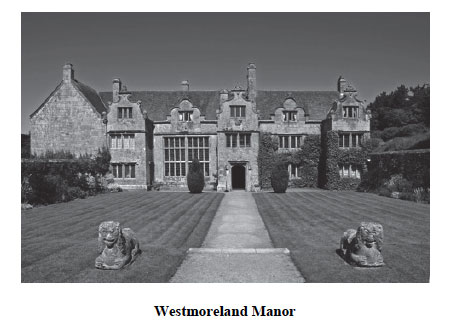
Soon after Hitler took power in 1933, observers in the United States and other western democracies questioned the morality of supporting an Olympic Games hosted by the Nazi regime. It had been awarded the games in 1931 prior to Hitler coming to power. Responding to reports of the persecution of Jewish athletes in 1933, Avery Brundage, president of the American Olympic Committee (AOC), stated:
The very foundation of the modern Olympic revival will be undermined if individual countries are allowed to restrict participation by reason of class, creed, or race.
Brundage, like many others in the Olympic movement, initially considered moving the Games from Germany. After a brief and tightly managed inspection of German sports facilities in 1934, Brundage stated publicly that Jewish athletes were being treated fairly and that the Games should go on, as planned.
England 1936
Julie and Harry had settled into their seventeenth-century manor house left to them by his mother and father. The Earl and Duchess had been killed in a motor vehicle accident while they were travelling from the family castle, Raby, to their Surrey manor house in 1934.
Harry and Julie were now the Earl and Duchess of Westmoreland and were now the custodians of Raby Castle and Westmoreland Manor.

Although they were titled, they tended to use their professional names, Dr Harold de Neville and Dr Julie Doherty.
They decided to attend the Berlin Games. It would give them the opportunity to see Julie’s brother, Jack and soak in the atmosphere of the Games. They did have concerns about the Nazis but decided to put them aside for the sake of the visit.
Julie telephoned Jack.
‘Hello Jack, it’s Julie, how are you?’
‘Julie! Hello! I’m good thanks. And you?
‘We’re both well.’
‘I suppose I should be calling you Duchess from now on.’ Jack couldn’t resist a dig at her new status.
‘Don’t be silly Jack! Now listen, Harry and I have decided to come to the Olympic Games and wonder if you’d like a couple of visitors?’
‘That would be great! I’m sure Anna will agree with me. We’d love to have you come and stay. How soon before the Games start will you be arriving?
‘We thought we might get to Berlin on the 30th July – that would give us a couple of days before the opening ceremony on the 1st August.’
‘I just need to get clearance from the Ambassador as our house in on Embassy grounds but I am sure there will be no problem. I’ll send you a telegram confirming if that’s OK.’
‘Harry and I are really looking forward to seeing you both. Goodbye Jack.’
‘Goodbye … Duchess!’
Harry and Julie flew to Berlin on Thursday 30th July and were met at the airport by Jack and Anna with an Embassy car. After the initial hugs and kisses they began their journey to the Embassy compound.
‘They love their Nazi swastikas don’t they Jack? They’re on every bloody building,’ commented Harry.
‘They sure do Harry, they want to make sure everybody knows who’s running the show.’
‘Is it as bad as what we read back home, about the Jews?’
‘I’m afraid so. Hitler ordered all the anti-Jew signs to be taken down for the duration of the Games but believe you me, they’ll be up hours after the closing ceremony. They are being persecuted, as are the left-wingers; Communists and such. This is a draconian administration. You cannot talk like this – even as a foreigner – if there’s a chance someone might hear you.’
‘So how do you go about your business and your lives when all this is going on?’
‘Very carefully.’
They pulled into the expansive US Embassy, and the Cadillac stopped outside a delightful bungalow with ivy growing up its white façade.
‘Well, this is it. Home,’ said Anna.
‘It looks delightful Anna. I’m sure we will love our stay here,’ said Julie as she opened the car door, eager to see inside.
It was in fact delightful. Their room looked out to a private courtyard with a rose garden in full bloom.
‘This is just beautiful, you two, no wonder you have stayed so long.’
‘Sis, the reason we have stayed so long is I’ve been ordered to stay here. We don’t really have a choice. However, living here makes it tolerable.’
The driver grabbed their luggage while Harry and Julie were given a tour of the house.
‘Thank you, Anna and Jack. For putting us up. As it were.’
‘Our pleasure. Now, Ambassador Dodd has invited us all for dinner tonight. Just casual. No need for a tuxedo, Harry.’
‘Well, that’s good considering I didn’t pack one. I do have a lounge suit – would that be suitable?’
‘That’ll be fine.’
‘I take it you have packed some nice frocks Julie?’
‘Yes Jack, you know me well.’ She laughed.
‘OK, we’ll leave you to unpack. Let’s say 6.30 pm in the lounge for a pre-dinner drink and then over to the Embassy for 7.30 pm dinner.’
‘Sounds good.’
Over dinner, in the sanctuary of the US Embassy and in the company of the Ambassador William Dodd and his delightful wife Mattie, they had a very frank discussion
‘So, Mr Ambassador have you met Hitler yet?’ asked Julie naïvely.
‘Please call me Bill. Yes Julie. I had to wait about two months to see the German Führer. Normally an Ambassador from a major power such as ours would wait two weeks after taking up the post.’
‘What was he like, Bill? Intimidating? Or comical?’
‘Certainly not comical. I arrived at Bismarck’s former palace where Hitler has his quarters. It was quite daunting, climbing up a very wide set of marble stairs guarded at every landing and turn by a Nazi SS soldier with their hands raised in Roman style.’
‘Did you feel compelled to return the Hitler salute, Bill?’ asked Harry.
‘I just bowed my head slightly. I certainly wasn’t going to comply with their ridiculous laws regarding salutations. I waited in his anteroom until the Minister for Foreign Affairs von Neurath invited me into the Chancellor’s office, a room some fifty feet square with tables and chairs scattered about for group conferences.’
‘Did you feel nervous at all?’ Jack inquired.
‘No Jack, not really. I certainly sat there in great anticipation, not knowing really what to expect.’
‘Did he goose-step in wearing his elaborate uniform?’ Anna asked, with an impish look on her face.
‘Anna! Of course not, in fact I was quite surprised he had dressed in a simple lounge suit, neat and erect-looking. Better in person than he had appeared in newspaper photos I had seen.’
‘Bill, are you permitted to divulge what you discussed with him?’ asked Jack.
‘It wasn’t all confidential Jack. I raised the assaults upon Americans and the discriminations against American creditors. He seemed very concerned. The German dictator even assured me that future attacks against US citizens in Nazi Germany would be strictly punished and that he would issue decrees that foreigners were not obliged to offer the Nazi salute.’
‘So you had a win on your first meeting with ‘the great Man’!’
‘Hmm, not entirely. The conversation turned to Nazi Germany’s withdrawal the previous Saturday from the League of Nations. I called it a ‘thunderbolt’, totally unexpected. This really started him off. He ranted about the Treaty of Versailles, the failure of the powers to keep their promises about disarmament and the indignity of keeping Germany in a defenceless status.
‘We discussed various other matters, which I am not at liberty to divulge. I departed after about forty-five minutes.’
‘What was your overall impression of Hitler, Bill?’
Probably the Führer’s belligerence and self-confidence. He’s certainly a man not to be taken lightly.’
‘Well I’m sure it is a meeting you will never forget,’ said Harry.
William Dodd’s final assessment of Hitler and his regime was as follows:
‘The Hitler regime is composed of … rather inexperienced and very dogmatic persons, all of whom have been more or less connected with murderous undertakings in the last eight or ten years. It is a combination of men who represent different groups of the present German majority, not an actual majority.’
By this point of his stay in Nazi Germany, the US ambassador had lost a bit of his naïveté. Concerning Hitler, Dodd wrote,
He has definitely said on a number of occasions that a people survives by fighting and dies as a consequence of peaceful policies. His influence is, and has been, wholly belligerent … In the back of his mind is the old German idea of dominating Europe through warfare.
Dodd’s final realisation of the threat posed by Hitler came too late, as by then he was unable to effectively use his post to urge Washington, London and Paris to oppose Hitler’s consolidation of control over Germany.
1st August 1936
Olympic Games
Jack had organised excellent seats for the party of four through his connections at the Embassy.
They arrived at the Olympic stadium two hours before the official start. The detailed program they received at the Embassy looked amazing.
Parade of dignitaries to either Mass (St. Hedwig’s) or a Protestant service (Evangelical Cathedral)
Olympic Flame Welcoming Ceremony at the Lustgarten with Hitler Youth Parade of dignitaries to the Olympic Stadium
Hindenburg Airship flies over the stadium with ‘XI. Olympiade Berlin 1936’ painted on its side
Hitler arrives at the May Field (staging area next to the Olympic Stadium) - Olympic Fanfare by Paul Winter performed from Marathon Towers of the stadium by military band
Hitler enters the stadium to ‘March of Homage’ by Wagner - Hitler is greeted by small girl who salutes him with ‘Heil, mein Führer’ and presents him with flowers as an Introductory Theme by Herbert Windt is performed
German National Anthem performed while every participating country’s flag is raised on poles surrounding the top of the stadium
Olympic Bell rung - inscribed across it ‘I summon the youth of the world’
Parade of Nations
Recording of Baron Pierre de Coubertain’s voice played - the same quote used in the 1932 Olympics
Hitler declares the games open
Olympic Flag raised - simultaneously: artillery guns fire, 20,000 carrier pigeons released, fanfare played from the Marathon Towers, mass orchestra and choir perform the Olympic Hymn conducted and written by Richard Strauss
Olympic Cauldron lit by Fritz Schilgen - German 1500 meter athlete who failed to make the German team, selected for his beautiful and graceful running style
Athlete’s Oath
Handel’s Hallelujah Chorus performed by 3,000 singers and orchestr
Athletes parade out of the stadium followed by Concluding Fanfare by Paul Winter
OLYMPIC YOUTH – mass play by Carl Diem – music by Carl Orff (performed under the floodlight at night)
Part 1: Children at Play – 2,500 girls 11-12 and 900 boys run into the stadium for the grand stairs and tunnel; dance; form the Olympic Rings; leave Part 2: Maidenly Grace – 2,300 girls 14-18 flood into the stadium; one begins a waltz; games follow with balls, hoops, and clubs; large group dance; form circle at one end of the stadium
Part 3: Youth at Play in a Serious Mood – thousands of boys flood field; sing and divide up into different national ‘campfires’; fight each other; thousands of flags of all the nations enter and march around the track while boys salute; forest of flags surround the cauldron while child recites poem ‘Hymn of Fire’
Part 4: Heroic Struggle and Death Lament – along the track advance dancing warriors each with a leader; leaders duel in a dance, one falls, the other wounded also falls; leaders led off the field in death procession; mass dance ‘lamentation’ performed by all; Beethoven’s Ninth, Fourth Mvt. begins; floodlights form dome of light over stadium; thousands of torches and flags wave on the track during the Ode to Joy.
No other Olympic Games had such an impressive opening ceremony. This was the first Olympics to use the ‘eternal flame’ with runners starting at Mount Olympus and finishing in Berlin ten days later.
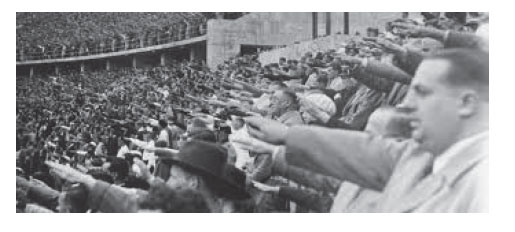
The group were close to the ‘Mayfield’, a grass area where the equestrian events took place; close to where Hitler and his cronies would be seated. When Hitler entered the arena the German crowd stood with their right arms outstretched yelling ‘ Heil Hitler’. The intensity and excitement in the arena almost persuaded Jack and Anna, and Harry and Julie to follow suit. They could now understand how he motivated the German people and terrorised the Jews.
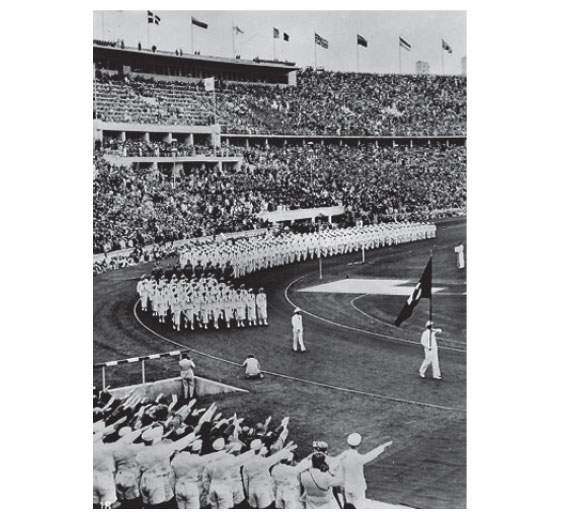
When the German Olympic team entered the arena the largely German crowd again rose with the Nazi salute.
When back in the quiet sanctuary of the American Embassy they poured themselves a drink and reflected on what was a spectacular, yet frightening, experience.
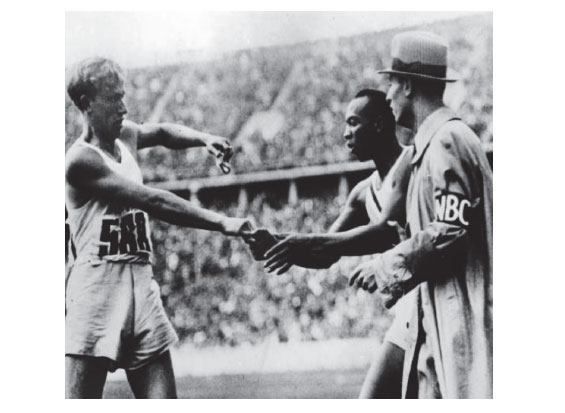
They all looked forward to the first day of competition the next day. They would be returning to the Olympic stadium for track and field. The three Americans in the group were looking forward to seeing the young Jesse Owens run and jump over the next few days.
Arriving at the stadium early, they took their seats ready to cheer on their heroes.
The first gold Jesse won was in the 100 metres, where Owens edged out teammate Ralph Metcalfe in a time of 10.3 seconds.
Gold number two came the next day in the long jump, where he fouled on his first two attempts. One was just a practice run where he continued down the runway into the pit, but German officials didn’t buy it and counted it as a jump. Top German long-jumper Luz Long suggested Owens play it safe and jump a few inches before the usual take-off spot. He took his advice and qualified for the finals, where he won the gold with a leap of 26 feet 5½ inches. Long was there to congratulate him.
‘It took a lot of courage for him to befriend me in front of Hitler,’ Owens would later say. ‘You can melt down all the medals and cups I have and they wouldn’t be a plating on the 24-karat friendship I felt for Luz Long at that moment.’
The third gold was in the 200-metre dash, where he defeated, among others, Jackie Robinson’s older brother Mack, and broke the Olympic record with a time of 20.7 seconds.
Gold number four was a controversial one – not with the Germans, but with his fellow Americans. American Jews Marty Glickman and Sam Stoller were supposed to run for the United States on the 4x100 relay team. At the last minute, Owens and Metcalfe replaced them and it was reported that Hitler asked US officials not to embarrass him any further by having two Jews win gold in Berlin. Whether that’s true or not, the Owens-led US team rolled to victory in a world record time of 39.8 seconds and Owens’ magical Olympics came to a close.
While German officials denounced Owens, an overwhelming majority of the German fans treated him like a hero. In 1984, a street in Berlin was named in his honour.
Everyone knows that at the 1936 Olympics Hitler snubbed Jesse Owens. As the story goes, after Owens won one gold medal, Hitler, incensed, stormed out of Olympic Stadium so he wouldn’t have to congratulate Owens on his victory.
Such a performance would have been perfectly in character, but it didn’t happen. William J. Baker, Owens’s biographer, says the newspapers made up the whole story. Owens himself originally insisted it wasn’t true, but eventually he began saying it was, apparently out of sheer boredom with the issue.
The truth of the matter was Hitler did not congratulate Owens, but that day he didn’t congratulate anybody else either, not even the German winners. As a matter of fact, Hitler didn’t congratulate anyone after the first day of the competition. That first day he had shaken hands with all the German victors, but that got him in trouble with the members of the Olympic Committee. They told him that to maintain Olympic neutrality, he would have to congratulate everyone, or no one. Hitler chose to honour no one.
Harry and Julie also attended the swimming and the rowing then returned to England before the closing ceremony.
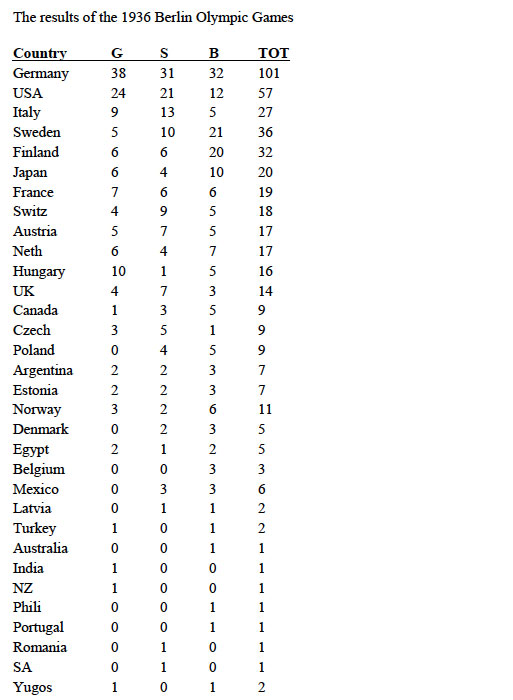
Hitler got his wish: Germany dominated the medal count proving to the world Germany was a superior nation; an enormous propaganda win for the Nazis.